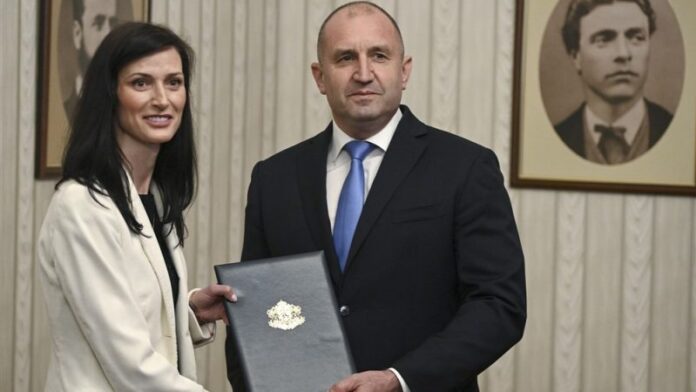On Monday, Bulgaria’s President Rumen Radev handed over the mandate to form a government to Mariya Gabriel, who stepped down from her job as EU Commissioner for Innovation, Research and Culture on the same day, according to Euractiv.
Gabriel’s resignation was accepted by Commission President Ursula von der Leyen, who thanked her for her work and wished her to make use of her EU experience in her country.
Von der Leyen announced that in the meantime, Executive Vice-President Margrethe Vestager and Vice-President Margaritis Schinas will oversee her portfolio.
Gabriel’s return to national politics was an initiative of the leader of the GERB party Boyko Borissov, in an attempt to unblock successive failures to form a viable government after five elections were held in Bulgaria in the past two years.
The GERB party won the 2 April elections but has only 69 MPs in the 240-seat parliament, and needs help finding allies.
“I will do everything possible for Bulgaria to have a stable, working, regular government. For this, my proposal will be for an expert government, united around clear priorities that have one goal – the well-being of Bulgarians and the authority of Bulgaria,” said Gabriel as she received the mandate.
Radev, for his part, said he had given Gabriel a week to come up with a proposal for a cabinet, noting that her task will be difficult.
GERB proposes a government with a one-year horizon. This appears to fit Gabriel’s agenda because it will enable her to run for European Parliament next spring.
At this stage, GERB and the second political formation – the pro-European coalition Change Continues-Democratic Bulgaria (PP-DB) are at loggerheads regarding their respective visions for a government.
PP-DB has repeatedly stated that they will not support a government nominated by GERB. Thus, it appears unlikely at all that Gabriel would receive support from PP-DB.
Gabriel spoke on Monday with representatives of three other parties in parliament – the Bulgarian Socialist Party (BSP), the mainly ethnic Turkish Movement for Rights and Freedoms (DPS) and the populist “There is such a people” (ITN), in an attempt to find alternatives for parliamentary support.
After the talks, the leader of the socialists, Kornelia Ninova, announced that the BSP was withdrawing from the negotiations for a government with GERB’s mandate and would not support it in a parliamentary vote.
The populist ITN pointed out that the party’s support was not unconditional.
Only DPS clearly said that it agreed with Gabriel’s priorities and offered its experts to be part of the project.
If GERB had to rely only on DPS and ITN, the three forces would have a total of 116 MPs, five short of the majority needed. In theory, they could still elect a cabinet if several MPs of the opposite camp don’t attend the voting session.
According to the Constitution, the first mandate is given to the largest political force. GERB have seven days to form a cabinet. If the efforts to form a cabinet fail, or Parliament rejects the proposed cabinet, the second mandate will go to PP-DB. If they fail, the President will give a last mandate to a political force of his choice. If the third attempt fails, the President would dismiss the Parliament and call snap elections.
The current efforts to form a government are overshadowed by scandals surrounding Bulgaria’s prosecutor general Ivan Geshev, who was blamed, including by his deputy, for undermining the reputation of the judiciary system based on blunders in the investigation of an alleged assassination attempt. Gabriel has promised that the first step she will take is to ask for the removal of Geshev. The latter, however, said he had no intention to step down.


